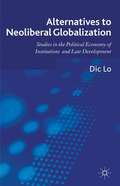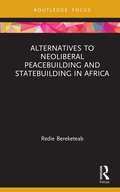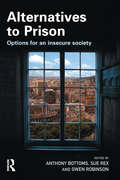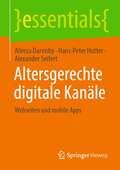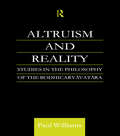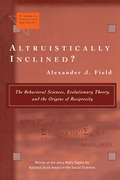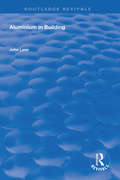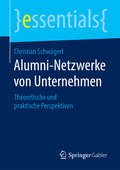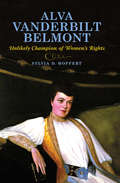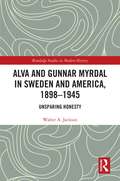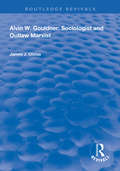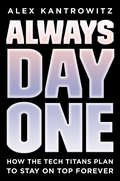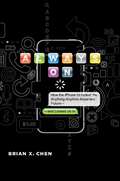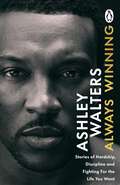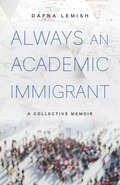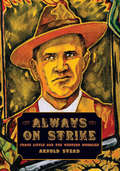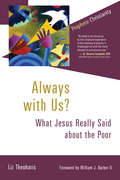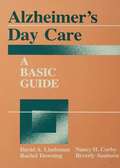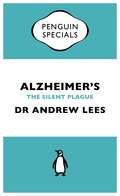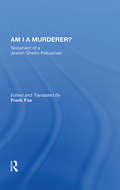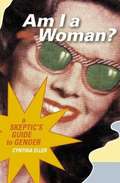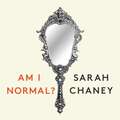- Table View
- List View
Alternatives to Neoliberal Globalization
by Dic LoThrough a compliance with the neoliberal doctrines associated with the Washington Consensus, and the corresponding emphasis on the privitization of public assets, the promotion of well-defined property rights and a focus on price and trade liberalisation, developing countries have been promised that 'natural economic institutions' will form. However, despite the promotion of these doctrines, the 1980s and 1990s have come to be known as the 'lost decades of development': a period of long economic stagnation in most parts of the developing world, with little sign of the income level of the developing world converging with that of developed countries. In this book, Dic Lo re-examines the mainstream policy doctrines of globalization, and formulates explanations for the uneven development of recent years. Through a comparative analysis of the actual experiences of developing nations and their policy positions, this book clarifies the positive and negative lessons that can be learned by developing countries. Dic Lo also undertakes an examination of the theoretical underpinnings of the competing doctrines of institutions and development, with a view to creating a synthesis that transcends neoliberalism, instead emphasising solidarity and humanistic development.
Alternatives to Neoliberal Peacebuilding and Statebuilding in Africa (Routledge Studies in African Development)
by Redie BereketeabThis book critically interrogates the neoliberal peacebuilding and statebuilding model and proposes a popular progressive model centred around the lived realities of African societies. The neoliberal interventionist model assumed prominence and universal hegemony following the demise of state socialism at the end of the Cold War. However, this book argues that it is a primarily short-term, top-down approach that imposes Western norms and values on conflict and post-conflict societies. By contrast, the popular progressive model espoused by this book is based on stringent examination and analysis of the reality of the socio-economic development, structures, institutions, politics and cultures of developing societies. In doing so, it combines bottom-up and top-down, popular and elite, and long-term evolutionary processes of societal construction as a requisite for enduring peacebuilding and statebuilding. By comparing and contrasting the dominant neoliberal peacebuilding and statebuilding model with a popular progressive model, the book seeks to empower locals (both elites and masses) to sit in the driver’s seat and construct their own societies. As such, it is an important contribution to scholars, activists, policymakers, civil society organisations, NGOs and all those who are concerned with peace, stability and development across Africa and other developing countries.
Alternatives to Prison
by Gwen Robinson Anthony Bottoms Sue RexAs the UK and many other western societies face up to the consequences of a rapidly increasing prison population, so the search for alternative approaches to punishment and dealing with offenders has become an increasingly urgent priority for government policy and society as a whole. This book reports the results of the research programme commissioned by the Coulsfield Inquiry into Alternatives to Prison, which was funded by the Esmée Fairbairn 'Rethinking Crime and Punishment' initiative. It is written by leading authorities in the field, and provides a comprehensive, authoritative and wide-ranging review of the range of issues associated with the use of noncustodial sanctions, examining experiences in Scotland and Northern Ireland as well as England and Wales.
Alternatives to the Central Bank in the Developing World
by Charles CollynsA national central bank is usually high on the shopping list of a newly independent country. Such a country often inherits a currency board—a carryover from the colonial era—and wishes to establish a new monetary authority with far wider executive powers and public responsibilities.
Altersgerechte digitale Kanäle: Webseiten und mobile Apps (essentials)
by Alexander Seifert Alireza Darvishy Hans-Peter HutterWorauf müssen Sie als Auftrageber*in achten, wenn Sie eine altersgerechte Webseite oder eine mobile Applikation entwickeln lassen? Dieses Buch erklärt Ihnen, wie altersbedingte Einschränkungen sich auf die Nutzung von Webseiten und mobilen Applikationen auswirken. Wenn gerontologische Aspekte im Design von digitalen Kanälen nicht berücksichtigt sind, tendieren ältere Menschen dazu, auf das entsprechende Angebot zu verzichten. Deshalb müssen Webseiten und mobile Applikationen die Bedürfnisse älterer Menschen berücksichtigen. Im Buch finden Sie nützliche Empfehlungen, wie Sie dies tun können, damit Ihre Webseiten und mobilen Applikationen für alle leicht zu bedienen sind.
Alterung und Pflege als kommunale Aufgabe: Deutsche und japanische Ansätze und Erfahrungen (Dortmunder Beiträge zur Sozialforschung)
by Franz Waldenberger Tomoo Matsuda Gerd Naegele Hiroko KudoDie Beiträge in diesem Open-Access-Sammelband beschreiben und analysieren aus multidisziplinärer Sicht die Herausforderungen und Bewältigungsstrategien von Alterung und Pflege in japanischen und deutschen Gemeinden. Thematisiert werden rechtliche Rahmenbedingungen, zivilgesellschaftliches Engagement, Pflegekräftemangel, Technologiekonzepte für die Pflege und schließlich auch der Einfluss der Covid-19 Pandemie auf die Situation älterer und pflegebedürftiger Bürgerinnen und Bürger. Die Gegenüberstellung der Ansätze und Erfahrungen beider Länder erweitert das Spektrum an Gestaltungsmöglichkeiten und kann Impulse für eine Neuausrichtung bestehender Lösungsstrategien geben.
Altruism and Reality: Studies in the Philosophy of the Bodhicaryavatara (Routledge Critical Studies in Buddhism)
by Paul WilliamsBrings together Paul Williams' previously published papers on the Indian and Tibetan interpretations of selected verses from the eighth and ninth chapters of the Bodhicaryavatara.
Altruistically Inclined?: The Behavioral Sciences, Evolutionary Theory, and the Origins of Reciprocity
by Alexander J. FieldAlexander J. Field is the Michel and Mary Orradre Professor of Economics at Santa Clara University.
Aluminium in Building (Routledge Revivals)
by John LaneFirst published in 1992. Aluminium is a relatively new material, first used on a commercial basis just over 100 years ago. Today it has taken its place alongside other traditional materials as an established building element. In this variable reference source, John Lane discusses the history and development of aluminium usage in the building industry. Its characteristics of strength, lightness and durability, coupled with easy formability, make it and ideal medium for this market. The first section of this book is a general discussion of the metal, covering such areas as its properties, alloys, fabrication, joining and finishing. The second part details the aspects of aluminium which are of particular importance in construction, while the final section highlights some of its major uses in architecture and building. The text is amply illustrated with diagrams and photographs, and the appendices provide the reader with comprehensive details of relevant standards and contact addresses.
Alumni-Netzwerke von Unternehmen: Theoretische und praktische Perspektiven (essentials)
by Christian SchwägerlChristian Schwägerl beschreibt, wie Alumni-Netzwerke in die Kommunikationsfunktion von Unternehmen integriert sind. Das essentialvermittelt Reflexionswissen über das Spannungsfeld der netzwerkkonstituierenden Peer-to-Peer-Kommunikation und der interessengeleiteten Kommunikation des Unternehmens mit den ehemaligen Mitarbeiterinnen und Mitarbeitern. Darüber hinaus stellt der Autor die Wertbeiträge dar, die Unternehmen auf ihrem Absatz-, Ressourcen- und Meinungsmarkt mithilfe von Alumni-Netzwerken erzielen können.
Alva Vanderbilt Belmont: Unlikely Champion of Women's Rights
by Sylvia D. HoffertA fascinating biography of the New York socialite who played a surprising role in the fight for suffrage. Born in the middle of the nineteenth century, Alva Vanderbilt Belmont was known to be domineering, temperamental, and opinionated. She married two millionaires, and pressured her daughter to wed an aristocrat. This resolve to get her own way regardless of the consequences stood her in good stead when she joined the American woman suffrage movement in 1909. Thereafter, she used her wealth, her administrative expertise, and her social celebrity to help convince Congress to pass the 19th Amendment and then to persuade the exhausted leaders of the National Woman&’s Party to initiate a worldwide equal rights campaign. In this book, Sylvia D. Hoffert argues that Belmont was a feminist visionary and that her financial support was crucial to the success of the suffrage and equal rights movements. She also shows how Belmont&’s activism, and the money she used to support it, enriches our understanding of the personal dynamics of the American woman&’s rights movement. Drawing upon and analyzing Belmont&’s own memoirs, she illustrates how this determined woman went about the complex and collaborative process of creating her public self. &“Engaging . . . Highly recommended.&” —Choice
Alva and Gunnar Myrdal in Sweden and America, 1898–1945: Unsparing Honesty (Routledge Studies in Modern History)
by Walter A. JacksonAlva and Gunnar Myrdal are the only couple ever awarded Nobel prizes as individuals: Gunnar won the prize in Economics in 1974, and Alva won the Peace Prize in 1982. This dual biography examines their work as architects of the modern welfare state and probes the connections between the public and private dimensions of their lives. Drawing on their extensive personal correspondence and diaries between their electrifying first meeting in 1919 and their protracted marital crisis in the early 1940s, this book presents the psychologist and the economist as they sought to combine love and work in an equal partnership. Alva and Gunnar simultaneously experimented with a new kind of intimate relationship and designed the social supports necessary for women both to bear and raise children and to contribute their talents and energies to society. Like all genuine revolutionaries, they struggled to free themselves from the burdens of their upbringings; to evaluate their own actions with what they called "unsparing honesty," and to test their policy recommendations in practice, measuring everything against the values they shared.
Alvin W.Gouldner: Sociologist and Outlaw Marxist (Routledge Revivals)
by James J. ChrissPublished in 1999, this book is an exploration of the life and work of American sociologist Alvin W. Gouldner. Gouldner's life and contribution to legal theory is a case study in the limits of critical, self-reflexive inquiry. Hegel's dialect is a major theme running throughout Gouldner's work, and, even throughout his life, Gouldner himself seemed trapped in the unfolding of the spirit through three distinct stages: 1945-1960 - thesis; 1960-1970 - antithesis; and 1970-1980 - synthesis or new thesis. Implications for creating a reflexive critical sociology in Gouldner's image are discussed.
Always Day One: How the Tech Titans Plan to Stay on Top Forever
by Alex KantrowitzAn acclaimed tech reporter reveals the inner workings of Amazon, Facebook, Google, Apple, and Microsoft, showing how to compete with the tech titans using their own playbook.At Amazon, "Day One" is code for inventing like a startup, with little regard for legacy. Day Two is, in Jeff Bezos's own words, "stasis, followed by irrelevance, followed by excruciating, painful decline, followed by death."Most companies today are set up for Day Two. They build advantages and defend them fiercely, rather than invent the future. But Amazon and fellow tech titans Facebook, Google, and Microsoft are operating in Day One: they prioritize reinvention over tradition and collaboration over ownership. Through 130 interviews with insiders, from Mark Zuckerberg to hourly workers, Always Day One reveals the tech giants' blueprint for sustainable success in a business world where no advantage is safe. Companies today can spin up new products at record speed -- thanks to artificial intelligence and cloud computing -- and those who stand still will be picked apart. The tech giants remain dominant because they've built cultures that spark continual reinvention. It might sound radical, but those who don't act like it's always day one do so at their own peril. Kantrowitz uncovers the engine propelling the tech giants' continued dominance at a stage when most big companies begin to decline. And he shows the way forward for everyone who wants to compete with--and beat--the titans.
Always On
by Brian ChenAn intriguing, definitive analysis of technology's current all-in-one revolution, and a serious reflection on the social implications of an always on society.
Always Winning: The inspirational memoir and guide to life from the award-winning star of ADOLESCENCE and TOP BOY
by Ashley Walters Chris IsaieFROM THE STAR OF THE PHENOMENAL NETFLIX SHOW, ADOLESCENCE, COMES A POWERFUL MEMOIR, PACKED WITH INSPIRING STORIES AND HARD-EARNED WISDOM FOR LIFE'S MOST CHALLENGING MOMENTS.'A raw and inspiring testament to resilience.' STEVEN BARTLETT'A deeper truth that speaks to our whole time and culture, and offers us all a way forward.' AFUA HIRSCH'An important and powerful read.' IAN WRIGHTFrom Adolescence and Top Boy to So Solid Crew, Ashley Walters’ explosive on-screen performances and trailblazing music has always explored the same conflicting forces that have governed his life. Born and raised in Peckham, his father in and out of prison, Ashley found the gang culture in inner city London inescapable. At 15, he was stabbed in the neck and left for dead. At 18, he had a gun held to his head as he cradled his newborn son. At 20, he was sentenced to eighteen months in prison.In this brave and inspiring book, Ashley opens up about his turbulent past. He writes candidly about his battles with identity, addiction, family and fame, and the realisation that, after years of struggle, only he could change his future.‘Always Winning’ is the framework Ashley developed to turn his life around. Revealed for the first time in this book, explored through powerful stories from his life and career, he shares the principles of this philosophy and shows how anyone can use them to overcome their own challenges, helping them to align a true sense of purpose with inner happiness and personal success and fulfilment.
Always an Academic Immigrant: A Collective Memoir
by Dafna LemishImmigrant employees play an essential role in every industry, including academia, but the unique experiences of immigrant professors have received little study. Given that academia has its own distinctive cultural norms, do immigrant academics experience the same kinds of challenges endured by other immigrants? Always an Academic Immigrant is a collective memoir that gives voice to eighty-one academics who immigrated from thirty-seven countries for a career in an institution of higher education, in either the United States or one of ten other countries. Through in-depth interviews and observations from her own experiences as an immigrant scholar, Dafna Lemish shares the highs and the lows that academic immigrants feel as they search for both a country and an institution they can call home. She discovers the formative events that led these scholars to pursue careers outside their native lands and details the challenges they faced adapting to unspoken expectations in their new countries and workplaces. Ultimately, this book reveals the strategies that immigrant professors use to bridge their native and adoptive cultures while highlighting the vital contributions they have made to academia as scholars, teachers, and leaders.
Always on Strike
by Arnold SteadThough widely recognized as one of the Industrial Workers of the World's leading members and one of its most prominent militants, this is the first book-length biography of Frank Little. Little's life offers innumerable lessons for working class people facing many of the same economic injustices in today's world. Arnold Stead, PhD, is a poet, fiction writer, historian, playwright, and jazz and film critic. He lives in Minneapolis, Minnesota, with his wife and family.
Always with Us?: What Jesus Really Said about the Poor (Prophetic Christianity Series (PC))
by Liz Theoharis William BarberA strong theological call for ending the abomination of systemic poverty Jesus's words "the poor you will always have with you" (Matthew 26:11) are regularly used to suggest that ending poverty is impossible, that poverty is a result of moral failures, and that the poor themselves have no role in changing their situation. In this book Liz Theoharis examines both the biblical text and the lived reality of the poor to show how that passage is taken out of context, distorted, and politicized to justify theories about the inevitability of inequality. Theoharis reinterprets "the poor you will always have with you" to show that it is actually one of the strongest biblical mandates to end poverty. She documents stories of poor people themselves organizing to improve their lot and illuminates the implications for the church. Poverty is not inevitable, Theoharis argues. It is a systemic sin, and all Christians have a responsibility to partner with the poor to end poverty once and for all.
Always with Us?: What Jesus Really Said about the Poor (Prophetic Christianity Series (PC))
by Liz TheoharisA strong theological call for ending the abomination of systemic poverty Jesus's words "the poor you will always have with you" (Matthew 26:11) are regularly used to suggest that ending poverty is impossible, that poverty is a result of moral failures, and that the poor themselves have no role in changing their situation. In this book Liz Theoharis examines both the biblical text and the lived reality of the poor to show how that passage is taken out of context, distorted, and politicized to justify theories about the inevitability of inequality. Theoharis reinterprets "the poor you will always have with you" to show that it is actually one of the strongest biblical mandates to end poverty. She documents stories of poor people themselves organizing to improve their lot and illuminates the implications for the church. Poverty is not inevitable, Theoharis argues. It is a systemic sin, and all Christians have a responsibility to partner with the poor to end poverty once and for all.
Alzheimer's Day Care: A Basic Guide (Series in Death, Dying, and Bereavement)
by David A. Linderman Nancy H. Corby Rachel Downing Beverly SanbornA book whose purpose is to offer guidance to individuals, organizations and agencies on how to develop day care programmes for patients with Alzheimer's disease or a related dementia. A range of programme aspects are covered from administrative details to social factors and evaluation techniques.
Alzheimer's: An Essential Guide to the Disease and Other Forms of Dementia (Penguin Specials)
by Dr Andrew LeesA short, easily understandable account of Alzheimer's, by world expert Dr Andrew LeesBritain like the rest of the developed world is in the grip of a silent plague. Its thousands of victims can no longer make sense of the world and are contained for their own safety in fading Victorian piles and nondescript redbrick detention centres around the country. For them the present is a foreign country and the past a lost continent.There are now more people in the UK with Alzheimer's than the population of Liverpool, and four million Americans are reported to have the disease. Longevity is a major factor in the increasing incidence of the disease, with the number of over 65s in the UK having trebled in the last 100 years, and forecast to double again in the next 25 years. With such an alarming background, the race to find the causes - and therefore potentially a cure - for Alzheimer's is urgent. In this Penguin Special, Dr Andrew Lees, a world expert on the neurodegenerative diseases explains what we know, and don't know, about Alzheimer's and its amelioration. Dr Andrew Lees is Professor of Neurology at the National Hospital for Neurology and Neurosurgery, London, and Clinical Director of the Queen Square Brain Bank for Neurological Disorders. His major scientific research has been carried out in the field of dementias and Parkinson's disease. A native of St Helens, Lancashire, he lives in north London.
Am I A Murderer?: Testament Of A Jewish Ghetto Policeman
by Calel PerechodnikIn this moving memoir, a young Polish Jew chronicles his life under the Nazis. In the vain hope of protecting himself and his family, Calel Perechodnik made the wrenching decision to become a ghetto policeman in a small town near Warsaw. The true tragedy of his choice becomes clear when during the Aktion he must witness his own wife and child forced to board a train to the Treblinka extermination camp. Filled with loathing for the Germans, the Poles, his Jewish brethren, and himself, Perechodnik fled the ghetto to shelter with a Polish woman in Warsaw. In the course of 105 terror-filled days in hiding, he poured out his poignant story. Written while Nazi boots pounded the streets of the neighborhood and while his tortured memory was painfully fresh, this memoir has a rare immediacy and raw power. Shortly before his death in 1944, he entrusted the precious diary to a Polish friend. The document was eventually deposited in the Yad Vashem Archives in Jerusalem. Left nearly forgotten for half a century, it was finally published in Poland in 1993. We owe a great debt to historian Frank Fox for bringing us this sensitive translation, which reminds us anew of the power and truth of historical memory.
Am I A Woman?: A Skeptic's Guide To Gender
by Cynthia EllerAn analysis of the difference between gender and sex, with the author's personal examples. Includes bibliographic notes and complete index.
Am I Normal?: The 200-Year Search for Normal People (and Why They Don’t Exist)
by Sarah ChaneyA deep dive into the strange science of the 'Normal', and the roots of an anxiety-ridden modern obsessionBefore the nineteenth century, the term normal was rarely ever associated with human behaviour. Normal was a term used in maths, for right angles. People weren't normal; triangles were.But from the 1830s, this branch of science really took off across Europe and North America, with a proliferation of IQ tests, sex studies, a census of hallucinations - even a UK beauty map (which concluded the women in Aberdeen were "the most repellent"). This book tells the surprising history how the very notion of the normal came about, how it shaped us all, often while entrenching oppressive values. Sarah Chaney looks at why we're still asking the internet: Do I have a normal body? Is my sex life normal? Are my kids normal? And along the way, she challenges why we ever thought it might be a desirable thing to be.
